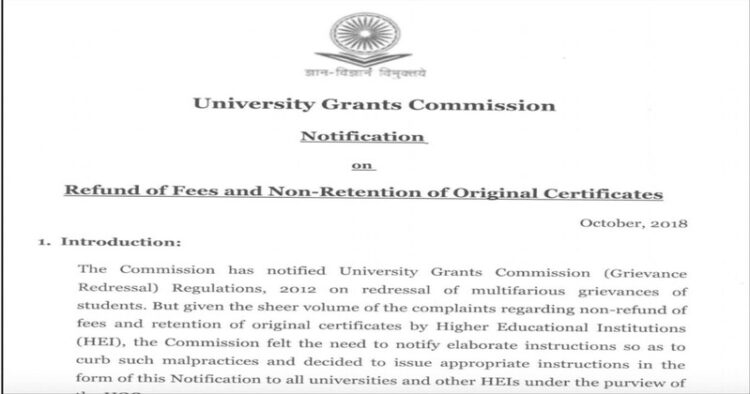The University Grants Commission (UGC) has released a decisive notification in which it has given order to the Higher Educational Institutions (HEIs) to refund the fees of those students who choose to migrate from one educational institution to another. This directive has been taken keeping in mind the multifaceted situation involving not only financial considerations but also legal and ethical impact.
Student migration has become a trend in the academic landscape. To understand, it is an act where students transfer from one college to another. There could be multiple reasons for such migration, like dissatisfaction with the current place, better opportunities or programmes in other colleges, or even personal reasons. In some cases, institutions themselves may face challenges, such as loss of accreditation, financial instability, or a decline in academic standards. Due to these issues, students are likely to make a swift decision to protect their academic interests.
In an official communication from the UGC, it was clearly stated, “The UGC has received numerous complaints concerning the non-refund of fees from various Higher Educational Institutions (HEIs). The UGC has, through emails and reminders, urged all HEIs to address the complaints lodged by students who are seeking a refund of fees paid to the institutions after their migration to other educational establishments.”
According to the directive, Higher Educational Institutions are mandated to initiate the process of fee refunds for such students. It also emphasised that there is a need for a comprehensive and student-friendly approach.
Regulatory bodies or legal authorities can interfere in cases where students are facing uneven circumstances in their original institutions and thus ensure a fair resolution. Such students, supported by the legal bodies, will be able to demand fee refunds. The fee refund will help students to rectify their mistakes and compensate for any financial losses they face during the migration process.
Moreover, the call for institutions to refund fees for students who wish to migrate has been the highlight in recent months. Due to several elite cases, this issue came to the forefront, shedding light on the difficulties faced by students. It also highlighted the necessity for a standardised and empathetic approach from educational institutions towards such students.
To have a clear roadmap, regulatory bodies and education institutes have started publicly recommending clearer guidelines on fee refunds. The educational institutions should adopt and practice transparent and fair policies and ensure even financial outcomes for all parties involved in such cases.
There is no doubt that institutions that have to make a refund will have challenges in implementing such policies, such as monetary implications, complex administration work, etc,. Also, in cases whereby students leave the institution midway through an academic term, the academic institutions are likely to face difficulties managing all the resources. These could be salaries of faculty members, maintenance costs, operational expenses, and many more.
Thus, maintaining a balance between protecting student rights and maintaining institutional stability poses a great challenge for decision making authorities.
Educational institutions will have to keep in mind the individual circumstances that lead to student migrations and try to possibly find out some flexible refund policies. This way, both parties can benefit.
Some education experts also state that either an independent ombudsman or mediation body should be established by authorities. This newly formed body could do fair and efficient dispute resolution between students and institutions regarding refund matters. Through this approach, the authorities will be able to address grievances promptly and ensure a smoother process for all parties involved.
The demand for institutions to refund fees for students who migrate to other colleges reflects the evolving landscape of higher education and the need for a more student-centric approach. While challenges exist on both sides, finding common ground through transparent policies and empathetic consideration of individual circumstances is crucial.
Regulatory bodies, educational authorities, and institutions will have to collaborate in order to establish major guidelines that protect students’ rights on one side while maintaining the stability and integrity of the education sector on the other. Then only, a fair and equitable resolution to the fee refund dispute can be achieved. The final resolution will foster a positive and supportive environment for students, for sure.




















Comments